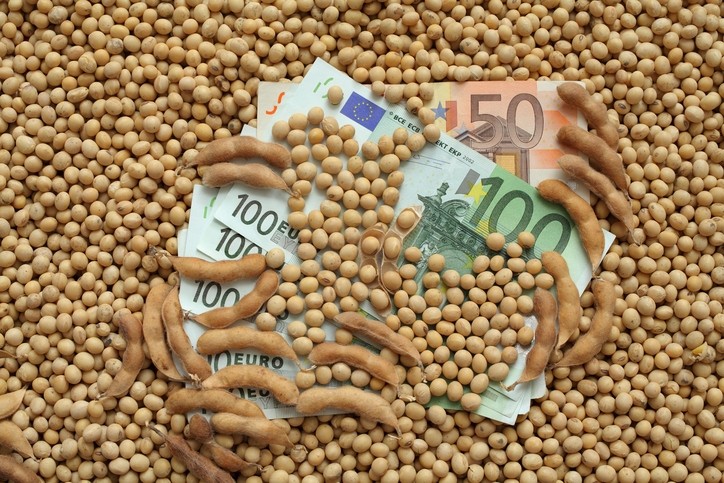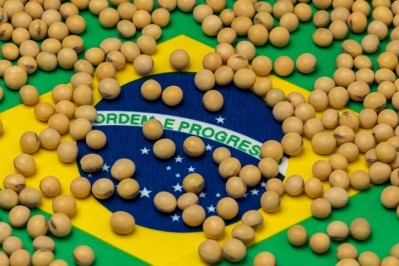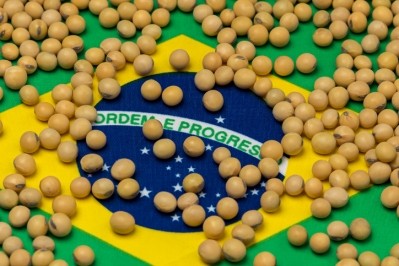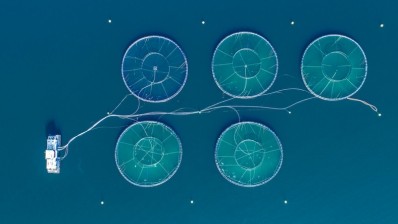Amazon fires: Norwegian pension fund demands action

So far this year, over 75,000 fires in Brazil have been recorded: an increase of 85% according to the Brazilian National Institute for Space Research (INPE).
The risk for contributing to human rights abuses and environmental damage is increased when companies are exposed to the Brazilian market, particularly for beef and soy, Jeanett Bergan, head of responsible investments, KLP, told FeedNavigator.
“We continuously monitor our investment universe to make sure we are not contributing to human rights violations and environmental degradation, deforestation, and so forth - that approach is part of our guidelines for investment,” she said.
KLP, in total, has invested US$14m in shares and loans in ADM, Bunge and Cargill.
“We are invested in 6,000 companies in 50 countries; we are directly invested in Cargill, Bunge and ADM and, in addition, we are invested in a lot of the financial institutions that are the biggest investors in these companies,” she said.
The pension fund wants to try and make investors and companies react, so they use their considerable influence to avoid complicity in environmental devastation going forward, she said.
“To establish a dialogue with these companies takes some time, but we have had some responses.
“While these companies and a lot of the investors have zero deforestation policies and responsible sourcing commitments, what we have been following up on and asking them about is what their concrete or extraordinary actions are now, given recent events.
“In Brazil, there has been monitoring, there have been fines issued when breaches of [environmental laws have been detected], when there has been illegal logging or illegal fires, but all of that system for making sure that responsible and sustainable sourcing is going on is kind of disappearing now, and we expect companies to react, to talk about what they are doing in response to that,” she told FeedNavigator.
Bergan noted that companies in the Nordics like Timberland, H&M and some of the large fish producers in Norway such as Mowi are threatening to boycott Brazil until they are sure the system to ensure responsible and sustainable sourcing is in place again.
“We applaud that [response], it is probably what is needed now, because you can’t really trust the system anymore,” she added.
Pressure on Chinese companies
European traceability systems and demands in relation to commodities such as soy are a lot stricter than in China, noted Bergan.
“We need to also start reaching out to many of the Chinese companies we are invested in, to see if we can try to influence them [in terms of ensuring they are not contributing to environmental degradation].”
However, it is challenging to establish a dialogue with companies in that region, she said. KLP does not have a huge amount of sway there due to the size of its ownership stake in such firms:
“That is why we have a strict policy and exclude companies if it comes to a situation where we are invested in company and we have documentation of a systematic or serious violation. We would then divest from that company publicly and, in that sense, we have a little bit more leverage than our ownership share would entail.”
Such an approach can work as companies don’t want to be blacklisted or have negative press:
“We try to be active owners, engage companies and then automatically divest if we don’t get positive results, but then we continue to engage, and try and get companies investable again. We have had some success stories in the past with this kind of dynamic.”
JBS – the world’s biggest meat company and a giant player in Brazil’s beef industry – is already excluded from KLP’s investment universe due to corruption and the pension fund is also putting pressure on investors that still hold shares in that group.
Cargill statement
Cargill issued a statement on September 5 on the Amazon fires:
It said the company was committed to protecting the Amazon.
“Illegal deforestation and deliberate setting of fires in the Amazon is unacceptable, and along with others in the food and agriculture industry, we will continue to partner with local communities, farmers, governments, NGOs and our customers to advocate for approaches to preserve this important ecosystem.
“We have firmly upheld the Brazilian Soy Moratorium in the Amazon since 2006 and do not source from newly deforested areas.
“Over many decades, Cargill has formed strong and collaborative relationships with numerous NGOs to address the challenge of protecting the environment while feeding the world. We remain committed to continue to work together with NGOs through constructive partnerships.”
It said it wanted to share “the facts” regarding Cargill’s business in the Amazon:
“We have firmly upheld the Brazilian Soy Moratorium in the Amazon since 2006, when we partnered with industry and environmental organizations to implement this voluntary agreement to not purchase soy from lands in the Amazon biome that were deforested after July 2006. This effort has contributed to the 80% decline in deforestation in the Amazon in the last decade and was extended indefinitely in 2016.
“We are not [sourcing from] and will not source soy from farmers who clear land in the protected areas and we have controls in place to prevent non-compliant product from entering our – and our customers’ – supply chains. This includes validating all supply against the Brazilian Forest Code Program through the CAR (Rural Environmental Registry) and cross-checking with the Brazilian government embargoed lists when we establish a contract, and again before receiving physical product.”
In terms of operating ethically and responsibly, Cargill said it has been and will always be committed to conducting business in a fair and responsible manner.
“From training 1.2 million farmers in more sustainable agricultural practices to advancing access to nutritious food and youth education in more than 54 countries, we remain firmly committed to supporting the communities where we live and work.”
Cargill said if cases of illegal activity are confirmed, it takes immediate action in line with its forest and sustainable soy policies and global supplier code of conduct.
“We are strengthening our grievance process to articulate more clearly the actions we take to ensure our policies are upheld.”
Feed players react
Danish fish feed manufacturer, BioMar, said industry-led initiatives have become even more important considering current events in Brazil, where despite an impressive legal framework, effective enforcement and implementation of key legislation is hampered by the sheer size of the country, the unstable political climate, and the lack of resources in key areas.
It issued a statement late August on the fires, referencing the conclusion of experts that 99% of the 40,000+ forest fires ravaging the Amazon this year have been set by humans.
“Unfortunately, people use the season of the ‘queimada’ or dry-season, to illegally clear forest for cattle and crops with fire. This cheap and effective method of deforestation is hard to combat, and irreversibly harmful to indigenous people and wildlife.”
BioMar said that, as awful as these fires are, they are not directly related to soy expansion into the Amazon, which is subject to the Brazilian Forest Code and is functionally illegal since the 2006 signing of the Amazon Soy Moratorium (ASM).
However, it acknowledged that, through its involvement in the capacity building project, Responsible Sourcing of Soy, Cattle, and Palm Oil, run by not for profit, NEPCon, and SEGES, with funding from the Ministry of Foreign Affairs in Denmark, it learnt that indirect conversion of Amazon rainforest lands for soy production still existed through loopholes.
“One such loophole involves slash and burn forest clearing for land sold to cattle ranchers for new pasture. Once grazed beyond productive capacity, these lands are sold to soy farmers, making soy indirectly responsible for deforestation. Recent estimates by the Yale School of Forestry and Environmental suggest that cattle ranching is responsible for approximately 80% of Amazon deforestation.”
The company concluded, though, after its own fact-finding mission to Sorriso, Mato Grosso in Brazil in spring 2019, that its soy suppliers are “far ahead of the pack in all areas of responsible soy production” due to robust sustainability platforms and ProTerra certification.
Nevertheless, it said the fires in the Amazon have stressed the urgency for BioMar to reach 100% certified soy as fast as possible. “In our latest sustainability report, we reported being on track to sourcing 100% certified soy by 2020, having now reached 92% for 2018.”
Skretting, the fish feed arm of Nutreco, also purchases a range of soy products from Brazil.
We spoke to Trygve Berg Lea, sustainability manager at the company, as it released a statement on the fires in the Amazon.
He said Skretting has no reason to believe that soybean farmers in its supply chain hold any responsibility for the fires in question, but he acknowledged that recent developments can be devastating for the reputation of soy from Brazil in the aquaculture value chain.
“We have contacted our three main soy protein concentrate suppliers in Brazil - Caramuru, Selecta and Imcopa - and we got preliminary feedback from all of them. They confirmed that neither they nor their suppliers are engaged in any illegal activities, but they share our concern that the massive global attention hurts the Brazilian soy industry.
“We are meeting them in the next few weeks, and this issue will be on agenda. We meet with them regularly as we have a continuous business relationship, the sustainability agenda has now become part of the regular agenda.”
Skretting uses a wide range of soy products but, for its salmon industry supply chain, it only buys 100% ProTerra or RTRS certified soy [for use] in Norway and Australia, while, for the Chilean and Canadian markets, a “major part is certified to the same standards or to the US soy sustainable soy protocol (SSAP).”
Close to 50% then of all the soy products purchased by Skretting are covered by either ProTerra or RTRS certification, continued Berg Lea. “That is an area where we can improve.”
ProTerra has stressed in recent weeks that no areas of native vegetation cleared or converted into agricultural areas or used for industrial or other commercial purposes, after 2008, can be certified under its standard.
Acknowledging that there is a need to develop better traceability systems in the global soy value chain, Berg Lea said it is a pity that there is such a negative focus on Brazil.
“I think that, in the future, if we are going to be able to source responsible, sustainably produced soy, it will be from Brazil. And, even with huge pressure on soy producers, you can never rule out illegal activity – that exists, to a certain extent, in all markets.”
BioMar also weighed in on that aspect.
“In this debate, it is important to point out that Brazil is in a state of rapid development and the country has already made significant commitments to sustainable soy.
“In 2017, out of 338 million tons of soybeans on the global market, only 5.1 million tons of non-GM, certified soy was available for purchase, or 1.5% by volume. Brazil accounted for 78% of this “gold standard” soy,” said the Danish company.









